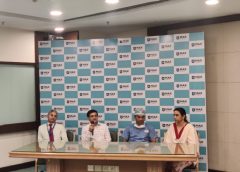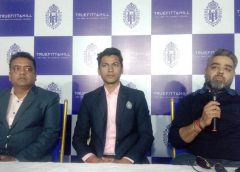Dehradun, June 8th, 2022: Brain tumours are increasingly affecting young and old alike. These could be malignant and benign. To create awareness on ‘World Brain Tumour Day’ experts from Max Hospital, Dehradun’s Institute of Neurosciences Dehradun (MIND), addressed the media today.
Present on the occasion were Dr. (Brig) H.C. Pathak VSM, Associate Director – Neurosurgery at MIND, Dr. Anand Mohan Thakur, Sr. Consultant, Neurosurgery at MIND, Dr. Kunj Bihari Saraswat, Consultant, Neurosurgery at MIND & Dr. Sandeep Singh Tanwar, Sr. Vice President – Operations & Unit Head, Max Super Speciality Hospital Dehradun.
Addressing the media, Dr. (Brig) H.C. Pathak VSM, Associate Director – Neurosurgery at MIND said, “All our body functions from eating to speaking to walking etc, and all our emotions are controlled by the brain, the spinal cord and nerves that are intimately connected. Any abnormal growth of brain tissues inside the skull leads to the formation of a “tumour”.
Early recognition of symptoms including persistent headaches could be beneficial. This can significantly improve the treatment outcome and recovery of patients, say doctors.
Elaborating further, Dr. A.M.Thakur, Sr. Consultant, Neurosurgery at MIND said, “These tumors can be malignant (cancerous) or benign (non-malignant). Malignant brain tumors, mostly, arise from brain matter (intrinsic) and can only be controlled for variable periods of time – after using all the various modalities of treatment available (surgery followed by radiotherapy and chemotherapy). Benign tumors, on the other hand, originate mostly from structures around the brain (extrinsic). They can be successfully removed surgically through a technique which does not leave scar known as keyhole surgeries.”
Citing a recent case Dr Kunj Bihari Saraswat, Consultant, Neurosurgery at MIND explained that, “A 44-year-old female approached neurosurgery OPD in Max Institute of Neurosciences (MIND) with complaints of progressive vision loss in right eye along with on and off headache for the past three years. Upon investigation via an MRI of the brain, we found a large tumor over the nasal and orbital cavities, compressing the right-side optic nerve. This was an extremely complicated case. We removed the tumour using the supraorbital keyhole approach. We kept the patient in the ICU for just one night and shifted her to the room the next morning and discharged her on the third day post the surgery.”
Keyhole surgeries are minimally invasive and can be done through small incisions or no incision at all resulting in better post-surgical outcomes as well as address post surgery asthetic concerns of a patient.
Dr. Sandeep Singh Tanwar, Sr.Vice President – Operations & Unit Head, Max Super Speciality Hospital Dehradun said that, “Brain tumors can be, and are often, operated upon while awake so that they can assist the surgeon by moving a part of the body or speaking during surgery. At MIND, we use all the 3 modalities, Neuronavigation, Intraoperative electrophysiology and awake craniotomy for maximizing patient safety and ensuring a total removal as possible. He also mentioned, “Max Dehradun is the only Hospital in entire Uttarakhand and Western UP to have these advanced technologies along with a team of dedicated neuro-anesthetists and a dedicated 8 bed Neuro ICU.”



